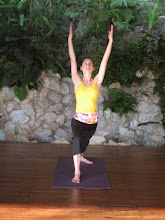
I was inspired to resurrect my sourdough starter and bake a loaf of naturally fermented (without the use of commercial yeast) bread after attending the "The Future of Food: Transatlantic Perspectives" conference at Boston University. Scholars, activists, consumers and farmers came together to discuss the 'growing global food crisis.' Translation: if we continue to produce and distribute food in the current fashion, we will run out of safe & nourishing food to satisfy the basic needs of the world's population and we'll lose precious food traditions not to mention biodiversity (ie. heirloom varieties of fruits & vegetables). Popular buzz words like "agribusiness", "fair trade" and "carbon footprint" were thrown around by panelists from the United States and Europe.
The person who grabbed my attention the most was Satish Kumar, a sweet Indian man with a record of civil disobediance who is currently active in the green movement in Great Britain. During the last panel discussion, he reassured the audience: "If you want to live, bake bread!" Rather than allow yourself to be paralyzed by fear of cataclysmic climate change, irreversible pollution and economic insecurity; Kumar suggests that we permit love & the joy of cooking to prevail.
No one has to tell me to cook. I adore cooking as much as the Indian gentleman relishes rolling chapatis. If there were one thing I would openly admit to not whipping up often enough, it would be fermented bread - aerated by the CO2 from either naturally occuring or commercial yeast from a packet. I do make muffins & quick breads (using baking powder and baking soda) on a fairly regular basis and have already shared recipes for carrot ginger muffins and Passover-friendly banana quinoa muffins. It's not that I don't like working with dough. Quite the contrary, kneading dough is a lot of fun, helps relieve stress and is a great upper body workout.
Yeast-risen bread just requires rearranging one's schedule to accomodate the active & passive work as well as baking time necessary. Once the commitment is made, you are at the mercy of organisms (usually Saccharomyces in colusion with some strain of Lactobacillus) invisible to the naked eye but without which a chewy loaf of goodness would be impossible.
Since I am not an expert (this past batch of bread was the first one I have made which was 100% sourdough - no cultivated commercial yeast added), I will not be posting a recipe. Besides, it's easy enough to pick up a good book about breadmaking (I really like The Bread Baker's Apprentice ) or look up detailed instructions on the internet. But I do have a few tips to share:
1. Be prepared for a mess! Take off your rings and watch, roll up your sleeves and don't wear anything you'd mind getting flour or dough on. Dough is a pain in the butt to get off cloth and carpeting.
2. Read the recipe through a few times before starting. I like to write down a time line to figure out when I'll need to get started and be home to tend to my living, breathing doughy beast.
3. Find a few friends who are also interested in making sourdough bread. Every time you feed your starter, there will be a portion discarded. Instead of throwing it away, give it to another adventurous person.
4. Temper your expectations, delighting in whatever result you achieve. Homemade bread can not and should not be compared to the products pumped out by a well-established bakery. Many professional bakers have the advantage of working with a 100+ year old sourdough starter created in a particularly favorable environment.
5. Don't be afraid to experiment! You should follow the basics steps outlined in the recipe you have chosen but try varying the type of flour and flavorings to suit your taste. When it comes to sourdough, don't discount an old family recipe or wive's tale. What's the worst that could happen?
6. Use high quality flour, preferably organic, that is unbleached and unbromated.
7. Have fun!





No comments:
Post a Comment